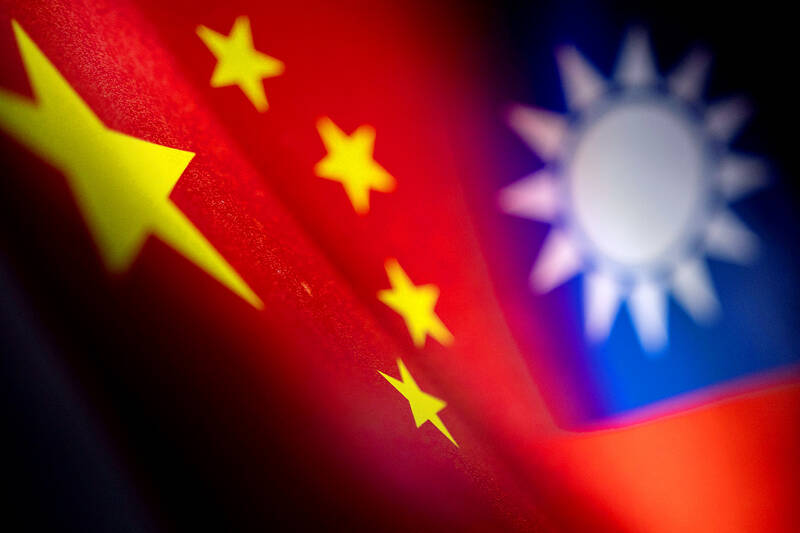Only 51 countries, not 180 as claimed by Beijing, adhere to its “one China” principle, a study by a Singaporean researcher showed.
In a paper published on Thursday, National University of Singapore assistant professor Chong Ja Ian (莊嘉穎) wrote that only 51 countries fully comply with the principle as Beijing defines it.
Chong, who is also a researcher at Washington-based think tank the Carnegie Endowment for International Peace, reviewed official documents from each country cited by China.

Photo: Reuters
Chong referenced a 1996 article by Soochow University professor Lee Tzu-wen (李子文) in which Lee researched Taiwan’s status in the international community.
Chong correlated that information with current documents from each country discussed in Lee’s article to show that, as of last month, only 51 nations “recognize the People’s Republic of China as the sole legal government of China, and agree that Taiwan is an inalienable part of China.”
Other countries use different wording in their official documents regarding China’s sovereignty claims over Taiwan.
Twenty-seven countries do not recognize the People’s Republic of China as the sole legal government of China, and do not mention Taiwan’s sovereignty, while 16 “acknowledge” the claims, Chong wrote.
Nine countries say that they “recognize” the claims of China, but four say they “understand and respect” the claims.
The Netherlands and South Korea say only that they “respect” the claims, while Russia says it “supports and respects” China’s position on Taiwan’s sovereignty.
The US’ “one China” policy says it “acknowledges” China’s position on Taiwan’s sovereignty, while 14 countries cited are Taiwan’s diplomatic allies.
The remaining countries in the report make no clear reference to Taiwan’s sovereignty in their official documents.
It has been Washington’s long-standing policy not to take a position on Taiwan’s sovereignty, but US officials rarely address its stance publicly.
One such instance was when then-Pentagon press secretary John Kirby told a news conference on Oct. 12, 2021, that the US has long abided by its “one China” policy, which is distinct from Beijing’s “one China” principle, which asserts sovereignty over Taiwan.
The US “takes no position over the sovereignty of Taiwan or on sovereignty over Taiwan,” Kirby said.
This story has been amended since it was first published.

MAKING WAVES: China’s maritime militia could become a nontraditional threat in war, clogging up shipping lanes to prevent US or Japanese intervention, a report said About 1,900 Chinese ships flying flags of convenience and fishing vessels that participated in China’s military exercises around Taiwan last month and in January have been listed for monitoring, Coast Guard Administration (CGA) Deputy Director-General Hsieh Ching-chin (謝慶欽) said yesterday. Following amendments to the Commercial Port Act (商港法) and the Law of Ships (船舶法) last month, the CGA can designate possible berthing areas or deny ports of call for vessels suspected of loitering around areas where undersea cables can be accessed, Oceans Affairs Council Minister Kuan Bi-ling (管碧玲) said. The list of suspected ships, originally 300, had risen to about 1,900 as

Japan’s strategic alliance with the US would collapse if Tokyo were to turn away from a conflict in Taiwan, Japanese Prime Minister Sanae Takaichi said yesterday, but distanced herself from previous comments that suggested a possible military response in such an event. Takaichi expressed her latest views on a nationally broadcast TV program late on Monday, where an opposition party leader criticized her for igniting tensions with China with the earlier remarks. Ties between Japan and China have sunk to the worst level in years after Takaichi said in November that a hypothetical Chinese attack on Taiwan could bring about a Japanese

MORE RESPONSIBILITY: Draftees would be expected to fight alongside professional soldiers, likely requiring the transformation of some training brigades into combat units The armed forces are to start incorporating new conscripts into combined arms brigades this year to enhance combat readiness, the Executive Yuan’s latest policy report said. The new policy would affect Taiwanese men entering the military for their compulsory service, which was extended to one year under reforms by then-president Tsai Ing-wen (蔡英文) in 2022. The conscripts would be trained to operate machine guns, uncrewed aerial vehicles, anti-tank guided missile launchers and Stinger air defense systems, the report said, adding that the basic training would be lengthened to eight weeks. After basic training, conscripts would be sorted into infantry battalions that would take

DEEP-STRIKE CAPABILITY: The scenario simulated a PLA drill that turned into an assault on Taiwan’s critical infrastructure, with the launchers providing fire support Taiwan yesterday conducted this year’s first military exercises at Longsiang Base in Taichung, demonstrating the newly acquired High Mobility Artillery Rocket System’s (HIMARS) ability to provide fire support and deep-strike capabilities. The scenario simulated an attack on Penghu County, with HIMARS trucks immediately rolling into designated launch areas and firing barrages at the Wangan (望安) and Cimei (七美) islands, simulating the provision of fire support against invading forces. The HIMARS are supposed to “fire and leave,” which would significantly increase personnel and equipment survivability, a military official said. The drill simulated an exercise launched by the Chinese People’s Liberation Army (PLA) Eastern